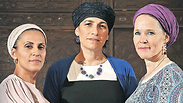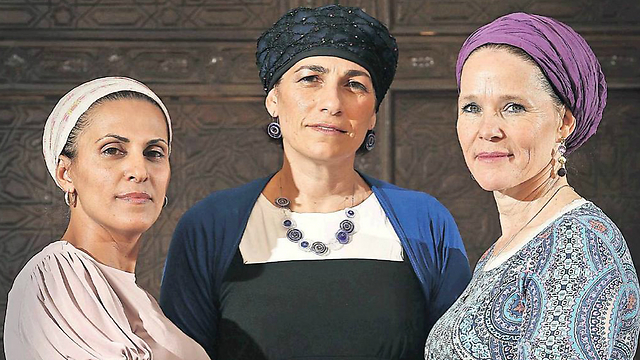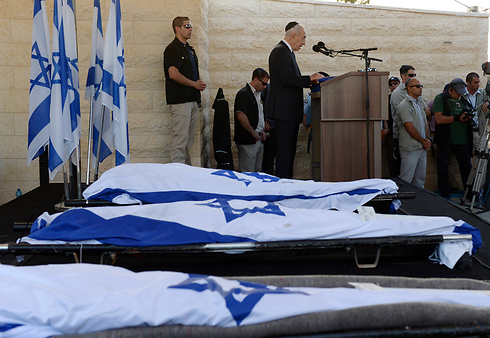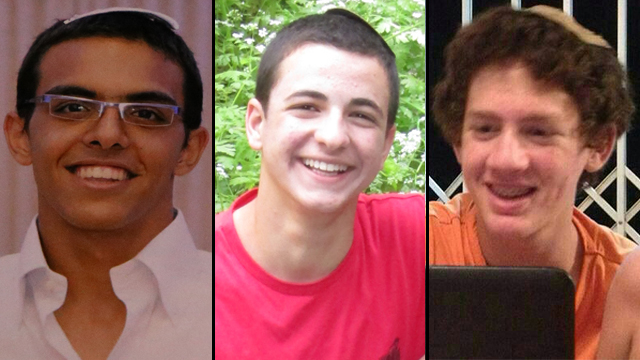
The public face of private grief
A year has gone by since Eyal Yifrach, Gil-Ad Shaer and Naftali Frenkel were abducted and murdered by Palestinian terrorists in the West Bank, but for their parents, the pain is still very fresh.
Iris Yifrach believed with all her heart that her son, Eyal, would return home alive. In June last year, the entire country was waiting for news of the three teenage boys abducted in the West Bank, and many were expecting the worst – but a calm and stubborn Iris was convinced that her son would return, and open the door, and call out loud to her, and tease her, and tell her all was fine, and ask her why she had been so worried.
"People said I was naïve, innocent, blind, but I didn't care," Iris says today. "Because knowing that everything would turn out well in the end helped me to get up in the morning. It was so tangible. It kept me going. That's how I was living then."
It's been a year since the abduction and murder of the three teenage boys – Gilad Shaer, Naftali Frenkel and Eyal Yifrach – and Iris is now slowly coming to terms with the harsh reality.
"There's an incomprehensible divide between what the brain understands and what the heart accepts," Iris says with a wry smile. "I truly sense this conflict between them. My brain tells me that my son won't be coming home, but my heart rebels and refuses to cooperate."
Rachel Frenkel and Bat-Galim Shaer are fighting the same battle.
"Naftali is in my prayers," Rachel says. "I don't talk to him; but when our eldest son went on a school trip, his guide asked us to write him a letter to take with. It was very meaningful to write to the children like that, with an open heart. So I decided two days ago to write a letter like that to Naftali too."
"And I talk to him all the time; I'm a real busybody mother," Bat-Galim says tearfully. "I ask him to watch over us, and I ask God to watch over Gil-Ad for me, to make sure he's doing ok up there."
"And I send Eyal text messages," says Iris, her voice shaking uncontrollably. "I text him all the time, keep him posted on what's happening. Just recently, for example, his friends threw a pre-army service party. I gatecrashed to see them dressed in their uniforms and took a picture to send to Eyal's cellphone. I have an ongoing one-way chat with him on WhatsApp. Because it always says at the top: Last seen 6/12/14, but I don't get the two ticks to show that the message has been received.
"People are always telling me that time heals, but time only burns the pain deeper and deeper inside me," Iris adds. "The opposite is happening; the longing is intensifying and it's harder to comprehend it. I say to my husband, Uri, that on the day we come to terms with the finality of what happened to Eyal, it will be very difficult for us to carry ourselves."
"In the beginning, I had a physical pain in my heart, a real burning, no matter what I did and what I said," Bat-Galim says.
"Gilad made himself heard all the time, and only recently have I managed to have a few moments in the day without thinking about him. Even with the physical pain, you can begin living a little. The change is very slow and gradual. There are still harsh bouts of longing and you remember things all the time. You need to find a balance so that you can continue to function. I don't know if I have found this balance; in fact, I know I haven't reached there yet, but there has been a slight shift of late at least."

"We received letters from Naftali's friends, and I decided to wait for special occasions before reading them," Rachel says, "because a letter like that can floor me for two days. A few months ago, I opened a letter from a friend who wrote things about Naftali that may have been somewhat critical too; he's probably too young to know how to write to a mother who has lost her son. But it was actually great for me, because it was just what I needed. There were truth and beauty in the letter because through it I could identify my son."
On September 23, 2014, three months after the abduction, Israeli security forces located and killed two of the Hamas terrorists in a house in Hebron. The third terrorist, who planned the abduction and murder, was apprehended and sentenced to three life terms in jail.
"I received a call that morning from the Shin Bet security service, and surprisingly felt nothing," Rachel recalls. "And then there came a sense of relief that the terrorists won't be able to harm anyone else. And after that I said at least the murderers who were killed won't be released in a prisoner-exchange deal… And then I went up to the kids and woke them and told them that there had been a battle in Hebron and that Naftali's murderers had been killed. The kids said: 'Yes!' And I said: That's right; it's nice sometimes when the bad guys lose."
"Knowing they had been punished and would no longer be able to cause harm gave me a sense of calm," Bat-Galim says. "Obviously nothing is going to bring the boys back, but at least the security system settled the score."
Private grief
For the three bereaved fathers – Uri Yifrach, Avi Frenkel and Ofir Shaer – the past year has taught them to sharpen the boundaries of personal grief.
"I've learned to see the bigger picture, not to discount the small things, but not to afford them too much importance either," Uri says.
"Because when you go through a difficult experience, the things you deal with on a daily basis lose their significance and shrink down to their original size. You raise a kid and want to see him grow before your eyes, follow the path you've laid out for him; you expect to see him enlist, travel, start a family. Over time, I am beginning to internalize the fact that it's not going to happen; but the conflict between one's emotions and one's mind never stops. It's hard for to comprehend that a child, who was so alive and present at home, can simply disappear all of a sudden."
"People remember us not as bereaved parents, but as a symbol of what they themselves felt at the time of the abduction and during the days that followed," says Avi. "But I feel that there is a big gap between our own private experience as bereaved individuals and how the public perceives us as bereaved parents."
"Our private pain reaches so deep; it's impossible to even begin to describe it," Ofir concurs. "People sometimes try to identify and say things like: 'I also have a son of 16; I can understand what you're going through.' And I want to say: You'll never be able to understand what I'm going through because you'll never be able to imagine losing your 16-year-old son for more than three seconds even… I talk to Gilad in my heart. I look up at the sky, and certainly at night, and I imagine his smile looking back at me from there.
"I convince myself that he's there and it helps somehow to digest things – because the human tools we have to deal with this kind of finality aren't good enough. To this day, I have the last message I sent to his mobile: Where are you? With five question marks."

Are there moments that break you?
"Every day and every hour – when the kids mention him, when I look at photographs and videos of him, when we sing Shabbat songs around the table without him," says a tearful Avi. "Every day is a kind of war and struggle to cope. But it is also a kind of continuity and a choice to live."
"For me, it comes in flashes," Ofir says. "I suddenly see a father resting his hand on his son in a synagogue and it hits me and pains me, and I go outside to cry in a quiet place. This past Saturday, I saw some guys wearing Bnei Akiva youth movement shirts. Gilad would also walk around in a shirt like that. Those are difficult moments. And then you have to take a deep breath and allow the pain to flow, without suppressing it, without fighting it."
"During the shiva, someone said to me: 'Don't concern yourself with the things Eyal never got to do; seek solace in the things he did get to do. And that was very comforting to me. Today I say: We're all here for a limited amount of time – some for 50 years, others for 90, and there are also those who come to the world for 16 years only. We all get there in the end. And that means we will meet up with the boys again. The meeting has simply been postponed."











